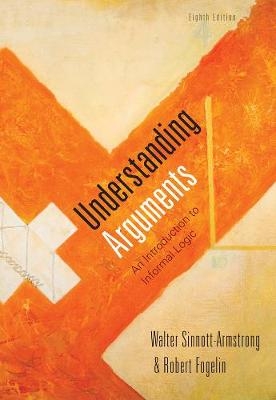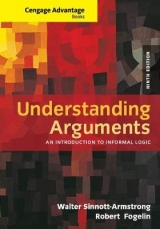
Cengage Advantage Books: Understanding Arguments
Wadsworth Publishing Co Inc (Verlag)
978-0-495-60395-5 (ISBN)
- Titel erscheint in neuer Auflage
- Artikel merken
Construct effective arguments with UNDERSTANDING ARGUMENTS: AN INTRODUCTION TO INFORMAL LOGIC, 8th Edition. Primarily an introduction to informal logic, this text provides a guide to understanding and constructing arguments in the context of academic studies and subsequent professional careers. Exercises, discussion questions, and readings help clarify difficult concepts and make the material meaningful and useful.
Robert J. Fogelin is Professor of Philosophy and Sherman Fairchild Professor in the Humanities at Dartmouth College. Walter Sinnott-Armstrong is Chauncey Stillman Professor of Practical Ethics in the Department of Philosophy and the Kenan Institute for Ethics at Duke University.
Preface.
PART I: HOW TO ANALYZE OF ARGUMENTS.
1. Uses of Argument.
What Arguments Are. Justifications. Explanations. Combinations: An Example.
2.The Web of Language.
Language and Convention. Linguistic Acts. Speech Acts. Conversational Acts. Summary.
3. The Language of Argument.
Argument Markers. If…then… Arguments in Standard Form. Some Standards for Evaluating Arguments. A Problem and Some Solutions. Evaluative Language.
4. The Art of Close Analysis.
An Extended Example.
5. Deep Analysis.
Getting Down to Basics. Clarifying Crucial Terms. Dissecting the Argument. Arranging Sub-Arguments. Suppressed Premises. Digging Deeper. An Example of Deep Analysis: Capital Punishment.
PART II: HOW TO EVALUATE ARGUMENTS: DEDUCTIVE STANDARDS.
6. Propositional Logic.
The Formal Analysis of Arguments. Basic Propositional Connectives. Conditionals.
7. Categorical Logic.
Beyond Propositional Logic. Categorical Propositions. The Four Basic Categorical Forms. Validity for Categorical Arguments
Appendix: The Classical Theory.
PART III: HOW TO EVALUATE ARGUMENTS: INDUCTIVE STANDARDS.
8. Arguments To and From Generalizations.
Induction versus Deduction. Statistical Generalizations. Statistical Applications.
9. Casual Reasoning.
Reasoning about Causes. Concomitant Variation.
10. Inference to the Best Explanation and from Analogy.
Inferences to the Best Explanation. Arguments from Analogy.
11. Chances.
Some Fallacies of Probability. The Language of Probability. A Priori Probability. Some Laws of Probability. Bayes' Theorem.
12. Choices.
Expected Monetary Value. Expected Overall Value. Decisions Under Ignorance.
PART IV: FALLACIES.
13. Fallacies of Vagueness.
Uses of Unclarity. Vagueness. Heaps. Slippery Slopes.
14. Fallacies of Ambiguity.
Ambiguity. Equivocation. Definitions.
15. Fallacies of Relevance and Vacuity.
Relevance.
16. Fallacies of Vacuity.
Circularity. Begging the Question. Self-Sealers.
17. Refutation.
What is Refutation?
PART V: AREAS OF ARGUMENTATION.
18. Legal Reasoning.
Components of Legal Reasoning. The Law of Discrimination. Regents of the University of California v. Bakke. Grutter v. Bollinger. Gratz v. Bollinger.
19. Moral Reasoning.
Moral Disagreements. The Problem of Abortion. Analogical Reasoning in Ethics.
Weighing Factors. A Defense of Abortion," by Judith Jarvis Thomson. "Why Abortion is Immoral," by Don Marquis.
20. Scientific Reasoning.
Standard Science. Scientific Revolutions. "Molecular Machines: Experimental Support for the Design Inference," by Michael J. Bebe. "Living with Darwin," by Peter Kitcher.
21. Religious Reasoning.
"Five Reasons to Believe in God," by William Lane Craig. "Seven Deadly Objectives to Belief in the Christian God," by Edwin Curley.
22. Philosophical Reasoning.
"Computing Machinery and Intelligence," by A.M. Turing. "The Myth of the Computer," by John R. Searle.
Index."
| Erscheint lt. Verlag | 10.2.2009 |
|---|---|
| Verlagsort | Belmont, CA |
| Sprache | englisch |
| Maße | 163 x 235 mm |
| Gewicht | 749 g |
| Themenwelt | Geisteswissenschaften ► Philosophie |
| Sozialwissenschaften ► Pädagogik | |
| ISBN-10 | 0-495-60395-3 / 0495603953 |
| ISBN-13 | 978-0-495-60395-5 / 9780495603955 |
| Zustand | Neuware |
| Haben Sie eine Frage zum Produkt? |
aus dem Bereich



